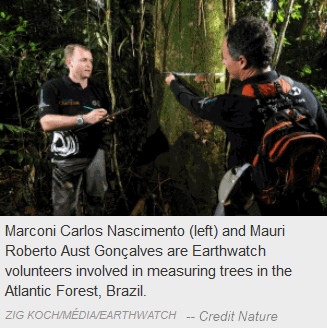|
News & Views item - December 2011 |
![]() Forest-Monitoring Project Has Measured 150,000 Trees. (December 31, 2012)
Forest-Monitoring Project Has Measured 150,000 Trees. (December 31, 2012)
 Nature
has reported on a joint project by
Earthwatch and a member of the
HSBC Climate Partnership which aims "to improve the way
that temperate and tropical forests are monitored in countries such as Brazil,
China and India, in order to better understand the way that forests capture and
release carbon". Some 2,200 volunteers (all HSBC employees) have been recruited
"to measure tree growth, study the decomposition of leaf litter on the forest
floor and analyse soil samples to estimate how much carbon is captured".
Nature
has reported on a joint project by
Earthwatch and a member of the
HSBC Climate Partnership which aims "to improve the way
that temperate and tropical forests are monitored in countries such as Brazil,
China and India, in order to better understand the way that forests capture and
release carbon". Some 2,200 volunteers (all HSBC employees) have been recruited
"to measure tree growth, study the decomposition of leaf litter on the forest
floor and analyse soil samples to estimate how much carbon is captured".
Robert Ewers, a forest biodiversity researcher at Imperial College London who is not involved in the project told Nature: "Forests play a huge role in regulating climates at global scale and provide livelihoods for many millions of people, so understanding how they are going to change and adapt to changing conditions is one of the most pressing environmental questions of our time. Every forest is different, so well-managed and quality-controlled citizen science such as Earthwatch’s programme represents a powerful way of gaining the large volumes of data that are needed to gain insight into the global patterns of forest change."
Although analyses of the data are in their early stages: "some studies, such as that in Gutianshan National Nature Reserve in Zhejiang Province, China, have already confirmed that plantations can be a haven for biodiversity. 'The number of tree species in some of the plantation forest plots approaches that of the primary forest,' says Dan Bebber, head of climate-change research at Earthwatch. He says that this proves the value of protecting such secondary forests, as well as pristine forests."
Another study in the Indian state of Karnataka has found "a high density of trees producing 'non-timber forest products', such as medicine and food. Results from the survey published earlier this year show that about one-third of such forests are vulnerable to climate change".
Dan Bebber, noted that the volunteers have measured more than 150,000 trees, equivalent to 60 years' work for one scientist while Deborah Hemming, head of climate impacts analysis at the Met Office Hadley Centre in Exeter, UK points out that: "Such information is often very time-consuming to collect, and many measurements cannot be monitored using remote sensing. The large amounts of data being collected by the programme's citizen-science efforts will provide a significant benefit to further the scientific understanding of current and future potential impacts of climate change on global forests."
Finally forestry expert N. H. Ravindranath told Nature: "There are no long-term monitoring studies on biodiversity as well as carbon stocks, and very limited modelling studies on climate-change impacts," and the indications are that Earthwatch plans to continue monitoring the sites in Brazil, China and India by working with local institutes.
However, whether or not that data and analyses will have a useful effect on overall forest protection and husbandry is a moot question.